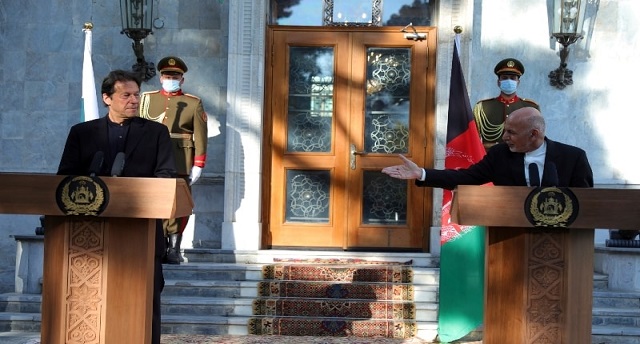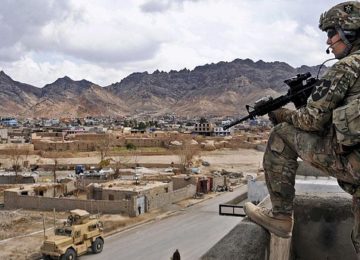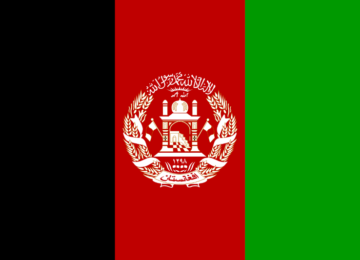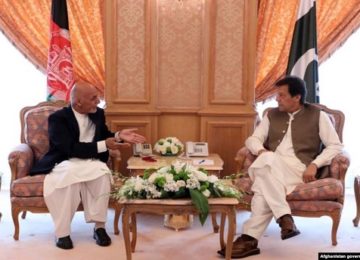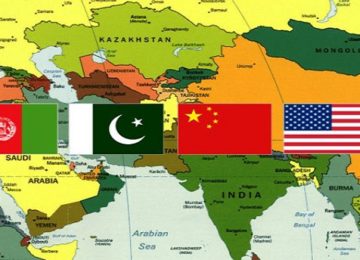November 20, 2020
During his maiden visit to Kabul on November 19, 2020, Prime Minister Imran Khan said that Pakistan will do everything possible to help reduce violence in Afghanistan and establish durable peace.
Addressing a joint press conference alongside Afghan President Ashraf Ghani at the Presidential Palace, the premier said that the two countries have historical links.
“The idea of visiting at a time when violence is increasing [in Afghanistan] is to assure you, President Ghani, that the people and the government of Pakistan have only one concern; peace in Afghanistan.
“The Afghan people have suffered for four decades,” he said. The premier also noted that despite the role Pakistan has played in getting the Taliban to speak with Americans and with regards to intra-Afghan dialogue, the level of violence has risen in Afghanistan.
Assuring the Afghan leadership that Pakistan will play its part in reducing violence in the country, he said: “If you feel there is somewhere Pakistan can help, please let us know.
“We assure you that we will do whatever is within our reach,” he said. He stated that one of the reasons Islamabad was pushing for peace in Afghanistan is because of Pakistan’s tribal areas which were devastated by the ‘war on terror’.
“The only way to help people on both sides of the border is by peace, trade and connectivity,” he said.
‘Shared vision’
During the premier’s visit, the two countries jointly issued a document titled ‘Shared vision between Islamic Republic of Afghanistan and Islamic Republic of Pakistan to support peace and stability in both countries and the wider region.’
According to the document, a copy of which is available with Dawn.com, high-ranking representatives from Pakistan and Afghanistan affirmed that both countries “should look towards a future relationship built on trust, aiming to achieve tangible outcomes from that relationship”.
Some of the core elements of the shared vision that officials agreed for Afghanistan and Pakistan include:
- That Afghanistan and Pakistan should enjoy a “special relationship” founded on predictability, transparency, mutual and full respect for one another’s sovereignty, and on expanding and furthering their mutual interests through state-to-state mechanisms.
- That Afghanistan’s posture of “multi-alignment” with other countries, pursuing a number of friendly relationships, “presents a real opportunity for the two countries to exploit and conversely presents no threat”.
- That neither country’s territory should be used for “malicious purposes” against the other’s territory, and that both countries should work together to “identify and tackle enemies of peace”.
- That regional connectivity should be broadened and deepened, with an emphasis on trade, free movement of people, goods and services, opening of trade and customs posts, and transport and energy infrastructure development, aiming for regional development dividends greater than what each country might expect to achieve alone
- That a safe, time-bound and dignified return of Afghan refugees from Pakistan would help the two countries address the humanitarian and socio-economic challenges associated with population displacement.
Next steps in Pak-Afghan ties
The document issued by the FO stated that Afghan and Pakistani representatives agreed that timely progress to meet the ‘shared vision’ would require “close coordination, a structured dialogue, and willingness to take difficult and courageous decisions”. They agreed to take rapid action on three main strands of activity:
- By December 15, 2020: Re-energising joint intelligence services-led work on analysing, mapping and cooperating against “enemies of peace and those undermining the peace process”.
- By January 1, 2021: A joint proposal for refugees’ return; elevating and intensifying treatment of this issue, to the point where credible and progressive action can start to be taken.
- By January 1, 2021: A joint proposal to further regional connectivity, in a way that strengthens both Afghanistan and Pakistan, as well as the wider region.
On the future of cooperation between the two neighbours, the document said the government leaders of both countries will visit each other’s capital alternately “to keep the momentum going” — an initiative started with the visit of Prime Minister Imran to Kabul. Afghan President Ghani will plan a reciprocal visit to Islamabad in the first quarter of next year, it added.
According to the statement, Afghanistan will share with Pakistan a “summary of the key issues that are being discussed during the Afghanistan Peace Process”.
Maiden visit
The Premier arrived in Kabul to meet with the Afghan President at a time when peace negotiations between the Afghan government and Taliban representatives have stalled and incidents of violence are rising.
This is the Premier’s first visit to Afghanistan since assuming office over two years ago. It is the highest-profile visit by a Pakistani official to Kabul since peace talks began between the Taliban and the Afghan government in the Qatari capital of Doha.
The Prime Minister is accompanied by Foreign Minister Shah Mehmood Qureshi, Director General of the Inter-Services Intelligence Lt Gen Faiz Hamid, Foreign Secretary Sohail Mehmood, Adviser on Commerce and Investment Abdul Razak Dawood, Special Representative for Afghanistan Muhammad Sadiq and other senior officials.
The Prime Minister was received by the Afghan Foreign Minister Mohammad Haneef Atmar and Afghan President’s Special Representative for Pakistan Mohammad Umer Daudzai on his arrival in the country’s capital.
Later Prime Minister Imran was presented a guard of honour at the presidential palace.
Qureshi thanks Afghan counterpart for warm welcome
Meanwhile, a delegation-level meeting was held between officials of Pakistan and Afghanistan in which both sides discussed Afghan peace process, bilateral relations, regional security situation and other matters of mutual interest.
The Pakistani delegation included Foreign Minister Qureshi as well as prime minister’s adviser Dawood, Foreign Secretary Mehmood and Special Representative for Afghanistan Sadiq.
Qureshi thanked Atmar for the warm welcome by the Afghan government and noted that both countries share a “traditional and historic relationship”.
Commenting on the ongoing peace process, Qureshi said that Prime Minister Imran had always maintained that the Afghan conflict could not be solved through violence. He added that regional security and stability “depended upon the establishment of peace in Afghanistan”
“The success of intra-Afghan dialogue is unavoidable for the establishment of lasting peace in Afghanistan,” Qureshi said.
“We are glad that today, the world is acknowledging Pakistan’s stance and lauding its mediation role in the Afghan peace process,” he said.
He added that Pakistan wanted Afghan refugees to return to their country in a “dignified” manner.
Withdrawal of US troops
The visit comes days after the Pentagon announced it would reduce the number of United States military personnel in Afghanistan from 4,500 to 2,500 by mid-January.
Due to leave office on Jan 20 after losing this month’s presidential election to Democrat Joe Biden, President Donald Trump is seeking to end the 19-year war in Afghanistan, the United States’ longest conflict.
Critics slammed Trump for timing the withdrawal to his own calendar as opposed to some kind of breakthrough in Afghanistan that would justify a major drawdown.
And outside of Afghanistan, nowhere is the risk of instability greater than in neighbouring Pakistan.
Mistrust has cloaked relations between the neighbours. As militants later began launching attacks inside Pakistan, it accused Afghanistan of stirring trouble in its borders.
Focus on deepening ties
“Focus would be on further deepening the fraternal bilateral relations between Pakistan and Afghanistan, the Afghan peace process, and regional economic development and connectivity,” the foreign office said in a statement as the prime minister headed for Kabul.
Pakistan’s role in the peace talks has been key, according to Washington, particularly given its influence over the Taliban leadership, though Pakistan says that influence has waned over the years.
Washington’s special representative for Afghan peace, Zalmay Khalilzad has made a number of trips to Islamabad to discuss the peace process.
Ghani had last visited Pakistan in June 2019, according to the FO.
A spokesman for the Afghan presidential palace, Dawa Khan Minapal, said the main purpose of the visit would be bilateral trade and economic relations, but the fight against militancy in the region would also be at the top of the agenda.
“The focus will be mainly on the peace process but we won’t keep our hopes high,” said a source in the Afghan presidential palace.
Violence has remained high in Afghanistan despite the ongoing peace process.
During the past six months, the Taliban have carried out 53 suicide attacks, while 1,210 civilians were among the thousands killed in violence linked to the insurgency, according to Tariq Arian, spokesman for the Afghan Interior Ministry.
Courtesy: Dawn News



